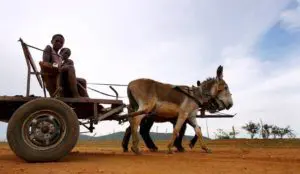The Great African Donkey Rush
This is excerpted from an article by Simon Allison for The Daily Maverick.
 Forget gold, diamonds or rhino horn. The hottest commodity in Africa right now – the most prized ass-et, if you will – is the humble donkey, thanks to a critical donkey shortage in China. But even this hardy beast of burden is struggling to carry the weight of an insatiable demand.
Forget gold, diamonds or rhino horn. The hottest commodity in Africa right now – the most prized ass-et, if you will – is the humble donkey, thanks to a critical donkey shortage in China. But even this hardy beast of burden is struggling to carry the weight of an insatiable demand.
Humanity owes a lot to the donkey. Domesticated for over five millennia, donkeys have been used for farming, transport, food and warfare. Hardy, reliable and uncomplaining, they are the ultimate beast of burden, not to mention the preferred ride of a certain Jesus Christ.
But as the world has industrialised, so donkeys are losing their place in it. Machines farm better, cars are faster, and donkey meat is an acquired taste. Only the very poorest communities still rear and rely on donkeys for their day-to-day needs.
Nowhere is this more apparent than in China. After two decades of high economic growth, the country’s donkey population has nearly halved: from 11-million in the late 1990s to just six million today.
The precipitous decline in donkey numbers has had an unintended consequence for a lucrative local industry: Chinese traditional medicine. When boiled, donkey skin produces a rubbery, gelatine-like substance, known as ejiao, which is believed to cure coughs, relieve insomnia and revitalise blood. It is a key ingredient in many popular Chinese tonics and medicines.
But these days, there simply aren’t enough Chinese donkeys to make enough ejiao, so manufacturers are looking further afield. Specifically, there are looking to Africa, where donkey populations remain in rude health.
